Highway District
Ongoing Projects and Achievements
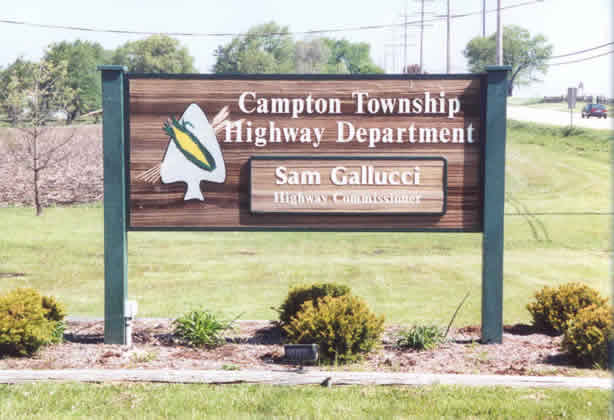
"Safety is Our Highest Concern"
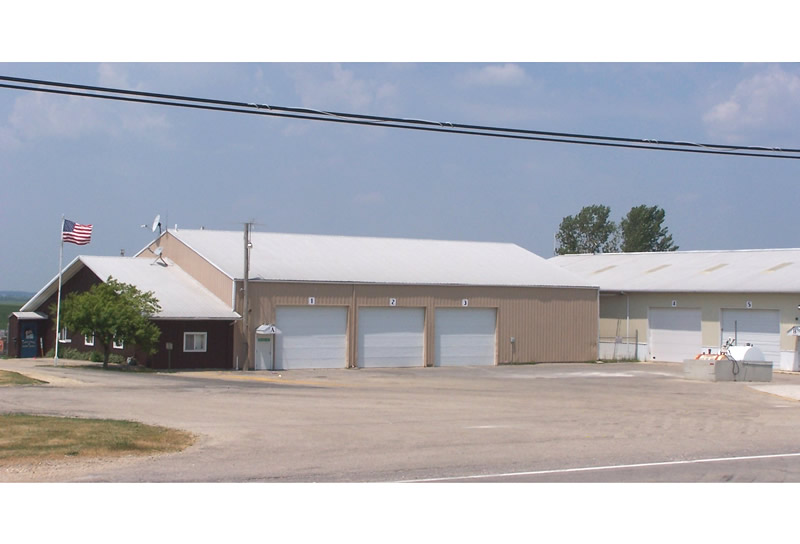
Highway District |
|
|
|
"Safety is Our Highest Concern" |
|
|
|
Motor Fuel Tax Maps are revised periodically to reflect additional roads and subdivisions that are dedicated to the Highway District to ensure that the appropriate amount of motor fuel tax revenue is disbursed to the district. Ditch Work, Culverts, and Catch Basins. Many road drainage projects are regularly performed each year that consist of excavating to shape and grade drainage ditches for proper water flow. The excavator is used to remove or add culvert ends, to clear and clean culvert openings, install or replace culverts, to install drain tiles, and to install or repair catch basins. After these operations are completed, shaping and grading is done before adding under-matting for gravel or stone such as large rip/rap or smaller 3” rock. Finally, soil is spread where needed and grass seed is then applied. | ||||||
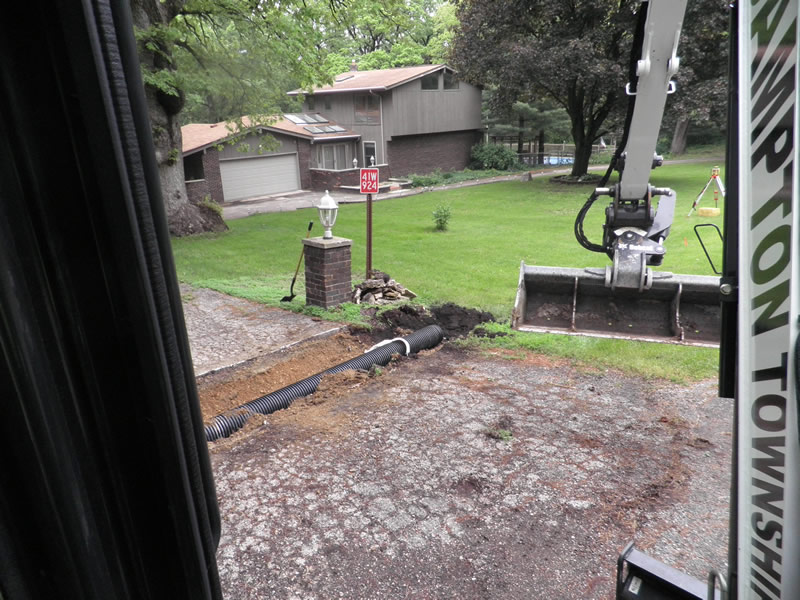
| ||||||
Another type of matting is sometimes added over the landscaping soil and seed work to hold soil and seed in place. These operations start in Spring and continue through Autumn each year. Some years, ditch and culvert work is limited to just a handful of roads or subdivisions and is completed in only a few months. Other years we may be in multiple subdivisions and on many of our streets and roads. It may consume 5 to 7 months of our road work schedule and begin at the spring thaw and continue to just before winter preparations for snow and ice removal. | ||||||
| ||||||
| ||||||
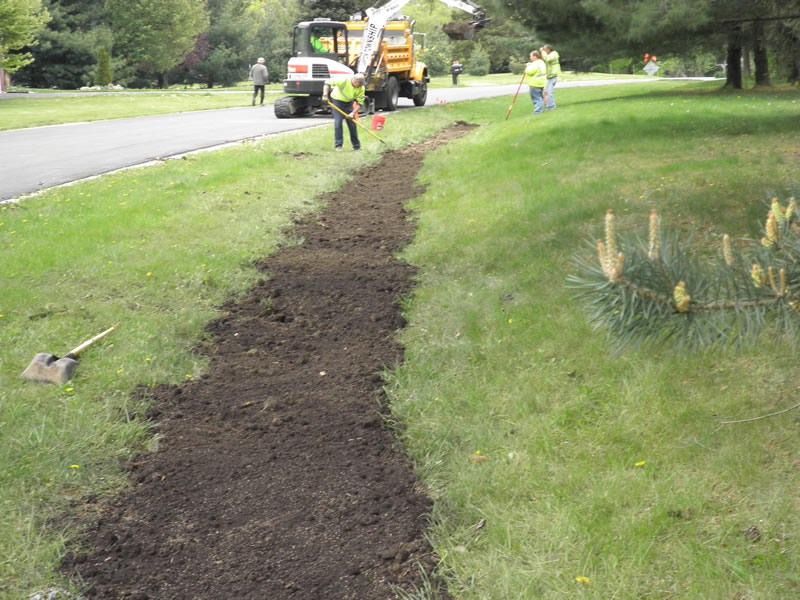 | ||||||
| ||||||
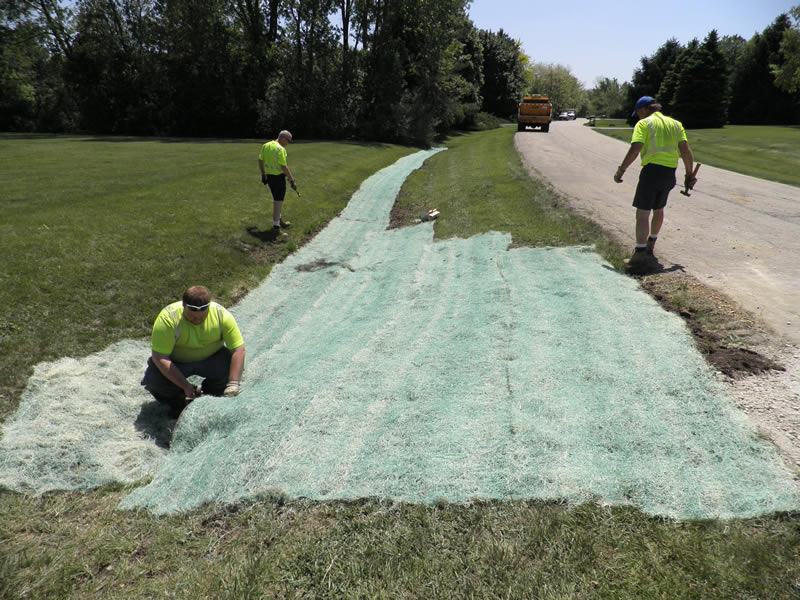 | ||||||
The Highway District performs many projects to preserve or repair the roads until funding allows repaving. One procedure the Highway District uses is Crack Sealing to keep water out of the cracks and from getting underneath the roads where it will undermine the strength of the road or freeze and break up the surface. This is also used on new overlays when they first begin to crack. | ||||||
| ||||||
Another commonly used procedure is the Coldpatching of potholes when they develop. It is accomplished by thawing any ice with a torch and blowing out the loose debris and water in the hole, if needed. Next, a cold patch asphalt material is used to fill the hole and we compress it to the road surface level and the edges all around the hole to seal out water. This will prevent the water from undermining the road and will help prevent further damage when the water freezes. | ||||||
| ||||||
| ||||||
When pavement gets to the point of cracking and separating, the Durapatch process pictured below is employed to hold the pavement together, seal up the cracks, and smooth out the surface. The spot to be repaired is swept or blown free of debris and the emulsion is applied first to seal the repair and provide a base for the patch. Then, a mix of emulsion and chips are applied. Finally, a top coating of chips finishes the process with excess chips being blown from around the repair back on to it. The vehicles passing over the patch will work in the chips as it cures and hardens. This is a process used nationwide on streets and highways by state, county, and township highway departments and districts. It is very effective in repairing and prolonging the life of a road surface. We employ this process until funds will allow either hot mix asphalt repairs or actually repaving the street or road. | ||||||
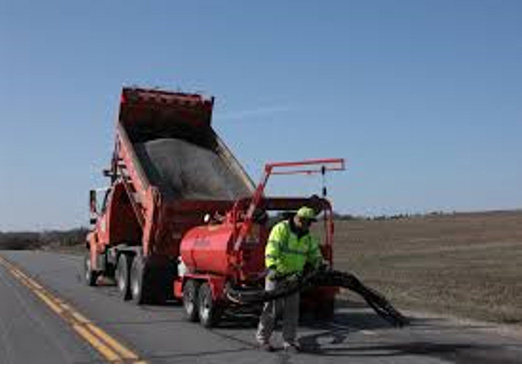
| ||||||
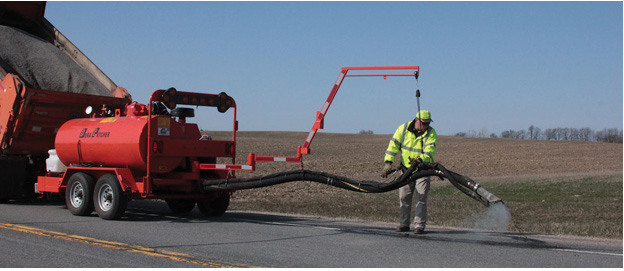
| ||||||
| ||||||
| Step 4 | ||||||
| ||||||
Hot Mix Repairs, pictured below, are used on exceptionally bad sections of road that need to be saw cut, milled out, and then patched with hot mix asphalt until the road can be repaved. | ||||||
| ||||||
Luting and Leveling the Asphalt | ||||||
| ||||||
| Waiting for the Roller | ||||||
|
| ||||||
| Large Hot Mix Repair | ||||||
| ||||||
| Repaving the Whole Road | ||||||
| ||||||
| Finishing Touches Before the Roller Completes the Job | ||||||
| ||||||
| The Rollers Finish the Project | ||||||
| ||||||
These ditch work and paving projects are just some of the many projects the Highway District performs to keep our roadways safe and ready for use by our residents and the general public. There are many other projects that keep our crews busy through the year. The projects listed below will help inform our community of the different functions that we perform each year. Adopt a Highway – A program adopted several years ago to help keep the roads cleared of litter tossed by passing motorists or garbage trucks that sometimes have debris blown out on to the road and right of way due to wind or higher speeds when traveling. Our first member was Boy Scout Troop #56 that takes care of Bolcum Rd. and Old Burlington Rd. Some roads are adopted by families that have volunteered. We provide and can deliver the safety vests, the grabbers, and the bags needed and pick up the vests, grabbers, and unused bags when volunteers have completed their project. If a weekend schedule is desired, we can drop off the equipment before the weekend and pick it up on a business day after the weekend. Volunteers start at one end of the road within the Township and work to the other. They tie off the bags they fill and leave them below the Adopt a Highway sign at either end of the road for us to pick up. Please, call our office if interested and ask about our program. Thank you! Road Sign Work – The sign manager and other crew members assist him in performing installation, maintenance, replacement, and inspections of all required road signs throughout the Township. This includes inspecting, replacing, recharging batteries, or the flashing beacon lamps as needed. These beacons are mounted on some signs for enhanced conspicuity. Road Marking and Striping – Center lines are painted yellow, road edge fog lines, cross walks, and stop lines are painted in white and all are painted by the road crew after initial lines applied by paving companies start to fade. Shoulder Gravel – Grading or adding gravel to strengthen and taper the road edges. Safety Training – Training on OSHA Compliance, general safety standards, PPE requirements, and safe and proper vehicle and equipment operation is conducted regularly as required. Training is conducted when a new standard or policy is implemented or modified, a vehicle or equipment is added or replaced, at initial employment, and at least annually as a refresher training session. Training and Certification – Appropriate personnel participate in training and certification classes and seminars as required to comply with OSHA and other Safety Agency requirements at the Federal, State, and local level. In-House Vehicle Repairs and Maintenance – Many large truck, light vehicle, and machinery maintenance and repairs are performed by our personnel to reduce costs and save taxpayer funding for other needs. In-House Building Maintenance and Repairs – Most building improvement projects are initiated and completed by our crew to reduce costs and keep highway district buildings and property repaired or maintained. Tree and Shrub Trimming or Removal – Trees and shrubs are trimmed or removed that restrict visibility to signage, curves, hills, and intersections. They are also trimmed or removed when overgrown into the roadways or interfering with drainage in ditches or at culverts or drain tiles. Downed Trees and Limbs – Removed by crew from roads and ditch right of ways to keep roads open and safe for our residents and other motorists and pedestrians. Road Grading – We still have gravel roads that need grading and gravel every so often and we sometimes grade or reclaim road shoulders along our paved main roads before adding shoulder gravel. We use our vintage road grader for these operations and it works quite well. Storm Damage – At the discretion of the Highway Commissioner a storm damage pick up may be declared if there is substantial and widespread damage to warrant a special pick up and does not occur too closely to a normally scheduled brush pick up. It will depend on critical road projects being completed and winter ice and snow removal preparations as well. Tree and Shrub Pruning AKA Brush Pick up or Brush Removal – Brush pick up is a courtesy service initiated by the Highway Commissioner several years ago that is performed in the Spring and Fall. It is only for the purpose of light tree and shrub pruning. Not intended for limb and tree removal. Please follow the guidelines described in our Brush Pick Up link and our handout flyer that we leave at residences that have violated the procedures outlined in either the link or the handout flyer. Failure to follow these guidelines results in a red tag and no pick up. These guidelines are to reduce injuries to the crew and to expedite the brush pick up. Thank you for your understanding and cooperation. Tractor Mowing – We employ a tractor with a pull behind mower and a tractor with a wing mower to maintain the open road ditches and right of ways along our main roads. We mow these areas twice per year and when there is a visibility issue near an intersection. Snowplowing, Salting, and Anti-icing – Before the winter season comes in the Campton Township crew prepare the trucks and machinery for the snow and ice to come. We have our trucks checked here at our shop and maintained and repaired as necessary. They are inspected at the safety lane twice each year. The plows are mounted and the salt spreaders are re-installed. We also prepare two trucks for anti-icing liquid to spray the roads and leave a dry salt residue to get a head start on freezing rain or light snow. This is a salt brine mixture with a small percentage of a mostly plant based additive that allows it to be effective at lower temperatures. It is the same additive that we mix in our salt for the colder temperatures. It is less corrosive to our equipment and less harmful to our environment than the chloride used in the past. Our snow removal procedure is to first come out and open up each route so the roads are passable. If it is a very light snow with warm enough temperatures to melt the remaining snow the day of the storm or the next day, we may not be out again. Some storms require us to open up more than once and severe storms may have to be opened up another time or two. At the end of the storm, or as it winds down, we come out a final time to widen the streets and roads and clean up intersections and cul de sacs. If a back to back storm is expected, we may not be out again until the second storm begins. If we have made our final pass and salted the roads we ask that snow is not pushed or blown into the road. It will pack down and freeze until it melts or until the next storm is salted and plowed off the roads.
| ||||||
Contents copyright © 2011 Campton Township.
All rights reserved. Site is best viewed at 1,024x768 resolution. Site
is most compatible with JavaScript-enabled Internet Explorer 7.0 or higher or Mozilla Firefox 3.0 or higher. For questions on site contact webmaster@camptontownship.com.
For all other inquiries, contact our Township offices: | ||||
|
Town Hall: 630-387-1016 |
Highway District: 630-365-9300 Fax: 630-365-0124 05N790 Route 47 Maple Park, IL 60151 highwaydistrict@camptontownship.com |
Assessor: 630-513-5430 |
||